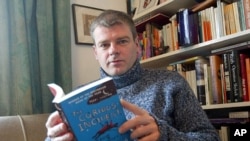From Victor Hugo's Les Miserables and Christopher Isherwood's Goodbye to Berlin, which became Cabaret, from Wicked to War Horse, novels are a popular source of stories for the stage.
Mark Haddon’s novel, The Curious Incident of the Dog in the Night-Time, although an international bestseller, was an unlikely candidate for a theatrical adaptation. But it, too, is now on Broadway.
A literary tour-de-force, the book is told entirely from the perspective of Christopher, a brilliant 15-year-old boy who happens to be autistic. His voice is so specific, so quirky, so smart, but so emotionally unaware that the reader needs to fill in the blanks.
Playwright Simon Stephens says that was his biggest challenge when Haddon, who he'd been friends with for some time, asked him seven years ago if he wanted to try adapting what he called his "unadaptable novel" for the stage.
Hesitant but intrigued, Stephens recalls giving himself a month "to put myself in a position, where after four weeks of trying, I could ring him up and say, 'Mark, you know this great unadaptable novel of yours? Guess what? It’s completely unadaptable!'"
"I think because I had that freedom, I approached it with a sense of play,” Stephens recalls with laughter.
Getting Inside Christopher's Mind
Haddon’s novel begins as a kind of a detective novel. Christopher decides to investigate the murder of a neighbor’s dog but uncovers much more than he expected — about his parents, his neighbors and himself — within his own emotional limitations. One of the first things Stephens did was give much of Christopher’s narrative to his special education teacher, Siobhan.
The two individuals, he realized, had a special relationship.
“I think it’s true, that everybody who has ever been to school — which, thankfully, in the western world at least, is pretty much everybody — has had a favorite teacher. And I thought that relationship between a teacher and a student could provide the dramatic muscle," he said. "And when I went down that route, I wrote it very quickly.”
In the novel, Siobhan encourages Christopher to write about his experiences.
Francesca Faridanay plays the teacher in the Broadway production and, as the actress puts is, serves as the bridge for the audience to get inside Christopher's mind.
"She starts off as a narrator, and then it’s clear that she’s so many more things than that and somehow finds her way into his mind,” she said.
Alex Sharp, 25, is making his Broadway debut as Christopher. He’s onstage for the entire play, but as the character, he can’t let his emotions show, except by moaning or having temper tantrums or furiously putting together an electric train set.
Sharp says he researched people on the autistic spectrum to put himself inside the mind of a boy who is both highly intelligent and very literal-minded.
“He has a line pretty early in the play which is, 'I don’t always do what I’m told.' And Siobhan says, 'Why not?' He says, 'When people tell you what to do, it is usually confusing and does not make sense,'" Sharp said. "For example, people often say ‘be quiet,’ but they don’t tell you how long to be quiet for,' which I just think is beautiful.”
Aiming to create an environment that puts the audience inside Christopher’s mind, director Marianne Elliott had the set designed to be like his brain — uninhibited and open.
"He loves math and he loves science and he loves graph paper, so the set is really four walls of graph paper in its most basic form," she explained. "It’s also a bit of a magic box. It’s a magic brain. It has wonderful things in that brain that are surprising. So there are traps inside the set and lit-up boxes from which he gets things, and things turn into things, because his brain is able to do that.”
The set transforms almost instantaneously from his home to his school to a terrifying trip on the London subway.
The actors transform, too. With each playing several different roles, they become a crowd on the street, or even a spaceship, lifting Christopher in the air as he talks about becoming an astronaut.
“It’s all about getting inside his head," Elliott said. "It’s all about making us feel how he feels in a fun, sort of joyful, playful way. But also in a way where we understand where he’s at and what he’s feeling."
Faridanay says much of this stage version of The Curious Incident of the Dog in the Night-Time feels very true, especially as Christopher’s father struggles to deal with a child who has special needs.
"I love that at the very heart of the story, it’s really about a family and about parents," she said. "And, just trying to be parents and dealing with the shortcomings, their own shortcomings every day and the guilt that ensues and their actions."
Elliott agrees, saying people may go into the play thinking it’s about an autistic kid, but discover the issues cover a far broader spectrum.
“Actually, it’s about all of us," she said. "It’s universal and it’s absolutely about humility.”
The Curious Incident of the Dog in the Night-Time, which opened in London, is now playing to rave reviews on Broadway.









